The GOP-led House and the Democratic-controlled Senate, in a compromise, put Gov. Terry Branstad in charge of signing off on any payments for publicly funded abortions. Republicans believed the added scrutiny might be a brake on abortions under Medicaid. Democrats noted the measure applied only to reimbursements, not approval ahead of time.
But about seven months after the new rule took effect, the consequences have surprised everyone, and illustrated the trickiness of bipartisan lawmaking on the issue. Branstad, a Republican and abortion opponent, hasn't approved any payments. But the few patients who were eligible for Medicaid-funded abortions received them anyway.
That's because the University of Iowa Hospitals and Clinics - where most of these procedures have been done in past years - simply decided not to bill the state for the 15 it had performed as of mid-February.
Those on all sides of the issue are now pondering what the work-around means for them and the larger abortion battle.
Abortion rights advocates aren't happy even though patients lost no access.
"At its heart it's very deceitful. The governor gets to say he never approved any Medicaid payments because no one ever asked him to. He's never presented with the bill," said Jill June, longtime president of Planned Parenthood of the Heartland.
Conservative Republicans see something gained.
"The ultimate goal is to make sure taxpayer dollars are not being used for a purpose that people find morally unconscionable," said Rep. Matt Windschitl.
Branstad, who is running for re-election, was spared some difficult decisions. Denying payments could have put him in violation of federal guidelines that require Medicaid to fund abortions in some cases.
"This was a compromise that was worked out by the legislature. It's not something we recommended," Branstad said, when asked for his thoughts on the outcome.
University spokesman Tom Moore said the state-owned hospital system decided to absorb the $27,500 cost of the procedures to stay out of the "politics of this matter."
Iowa's Medicaid program typically covers only a small number of abortions each year. Federal guidelines require the state to pay in cases of rape, incest and to save the mother's life. Iowa's program also covers some cases of fetal deformity.
Conservatives have tried to pass tougher restrictions on abortions, but have been stymied in the Senate. But last spring the political environment enabled some creative deal making. The policy change was included in a dense health care bill that included accepting additional federal dollars to expand low-income health care in the state, a key priority for Democrats.
Democrats reluctantly agreed to give the governor power over reimbursements-a provision unique to Iowa. It now seems moot.
"I think what's important is that the women that need these important health care services are getting them and there's no barrier to them," said Democratic Sen. Joe Bolkcom.
The University of Iowa Hospital system is owned by the university, which is a state department. But it receives no state funding except for Medicaid reimbursements, and plans to absorb the abortion expenses in its budget. June said that Planned Parenthood in Iowa uses private fundraising dollars to pay for abortions for other low-income patients.
It's possible a reimbursement request could still come across Branstad's desk at some point. Hospitals in the UnityPoint Health-Des Moines group have received Medicaid reimbursement in the past for abortions, but a spokesman said they have done no qualifying procedures this year. Spokeswoman Amy Varcoe said the policy of billing Medicaid for such procedures has not changed.
Elizabeth Nash serves as state issues manager for the New York-based Guttmacher Institute, a reproductive rights think-tank that tracks state policies on Medicaid abortions, called the Iowa situation "troubling."
"Certainly this idea that a provider doesn't seek out a reimbursement is troubling. It's troubling because this is a medical procedure that is legal and covered under some very limited circumstances but still is covered and should be treated as any other medical service," Nash said.

http://accesswdun.com/article/2014/2/271339
